- Home
- Linda Newbery
The Key to Flambards Page 4
The Key to Flambards Read online
Page 4
A smiley-faced lady flattened herself in front of her easel so that they could see only glimpses of the pencil and wash behind. ‘Oh, don’t look at mine. It’s awful. Joan’s is much better.’
‘No, really no good at all,’ said the woman next to her, but stood back for them to look. ‘Not compared to Keith’s. But I do try.’
Her mother and Roger found nice things to say, rather dutifully. Grace thought the two women were funny, trying to outdo each other in modesty, when anyone could tell that they both thought they were quite good.
Back in the stable yard, Roger pointed out the woods and fields that belonged to Flambards. A gate opened on to a grass meadow with a path mown through it, leading down a gentle slope towards a stile at the woodland edge. ‘There’s a lake down there, in the trees. Do go down and explore. There are good paths and a bird-watching hide.’
Uneven ground, Grace saw, where once she’d have set off running without a thought. A stile to climb. But she was determined to go and see for herself, liking the idea of a lake and a hide, a place to get away from everyone.
Someone was coming up from the wood: a tall figure, easily vaulting the stile and walking quickly towards them.
‘Good. Here’s Jamie.’ Roger waved, and the boy raised a hand in return. ‘He’s always around, holiday times and weekends.’
The boy came up to the gateway, his boots brushing through the grass. Grace saw straight sandy hair, a sunburnt nose, and a serious expression that broke into a wide smile for his uncle. She had been wishing for people her own age, but now felt shy of this purposeful newcomer. A camera was slung round his neck, and a small pair of binoculars. It was a proper camera, a big one with a protruding lens; he cradled it in one hand as if it were precious.
‘Hi, Uncle Rodge,’ he said, coming through. ‘The grebe was there again.’
‘That’s good.’ Roger put a hand on his shoulder. ‘Jamie, this is Polly and Grace. Polly and Grace Russell, that is!’
‘Pleased to meet you, Jamie,’ said Mum, while Grace and Jamie just said hi, briefly meeting each other’s eyes.
‘Are you looking for Marcus?’ Roger asked. ‘I haven’t seen him today.’
‘I’ll see if he’s over at the farm.’ Jamie was already walking on. ‘See you later.’
‘We ought to go back to the office,’ Roger said to Mum. ‘There’s a few things I want us to go through before the Trustees’ meeting tomorrow. D’you want to come too, Grace, or—’
Grace shook her head. ‘I’ll be fine.’
While Roger and her mother turned back through the stable yard, she opened the gate and went into the field. Becoming aware of the high burbling song of a bird overhead, she looked up and saw it, climbing, almost tumbling upwards, scaling the air. A skylark? She wasn’t sure she’d ever seen one before.
With the sun striking hot on her face and bare arms, the woods looked tempting, a path winding in. She reached the stile, paused with one hand on the top rail, then climbed it, swinging her right leg over and cautiously placing the foot on the crosspiece.
In the welcome shade of the trees she was faced with a choice of three ways to go. The tracks were bare earth, well-trodden, with woody roots threading across.
‘Hey!’
She turned, thinking for a moment that she’d been caught out doing something wrong. It was Jamie, jogging across the field she’d just crossed so laboriously.
So much for being by herself. Where she’d had to stop and assess the stile, and climb it in careful stages, he vaulted over again in that maddeningly easy way.
‘What?’ she said, as he caught up. ‘Roger said I could come down here!’
‘Yeah, course you can. Want to go to the lake? I’ll take you there if you like.’
His smile was open and friendly – but why would he want to bother with her? Assuming that Roger had asked him to follow her and show her the way, she grudgingly agreed.
‘It’s nice down here,’ he told her. ‘I come nearly every day.’
A bramble snagged her T-shirt as she let him pass on the narrow track.
‘Weren’t you looking for your friend?’ she asked. ‘Wasn’t he there?’
‘No, but I saw Sally. His mum. Marc’s helping his dad today.’
‘His dad is the one who drives the white van?’
‘Yes, Adrian. Marc works with him a few days a week, when thing are OK.’
‘Why wouldn’t things be OK?’
‘Well … his dad can be a bit difficult. I expect you’ll see.’
Grace wondered if she already had. She followed in silence. Jamie obviously knew all the woodland paths, veering off the clearly marked one they were on to step across a small stream. He held a low branch aside for Grace to pass underneath, and she saw the wary, concerned look on his face. He does know, she thought, stepping across to the firm ground on the other side; Roger must have told him. She hated the thought of them talking about her, but at least there was no need to explain.
Ahead she saw the glimmer of sunlight on water, closely hemmed in by trees. There were reeds, a sandy bank and two scrubby islands; a low wooden building on the far side must be the bird hide Roger had mentioned.
She noticed a post by the water’s edge with a lifebelt. ‘Is it deep?’
‘Over this side it is. There used to be a gravel pit here, before they filled it in. It’s shallower over where the hide is. That side’s best for waders.’
‘Waders?’ Grace imagined paddling.
‘Wading birds. Like sandpipers and egrets and snipe. We get those here. Sometimes a water-rail.’
Grace had no idea what any of those birds looked like. ‘Is this what you do, then? Bird-watching? Taking photos?’ She indicated the camera and binoculars slung round Jamie’s neck.
‘Yeah. You can call me a geek if you like. Some people do.’
‘I wouldn’t call that geeky! I mean, I like birds too. Not that I know much about them. But I watch on TV sometimes. Springwatch, Chris Thingy and Michaela. Mum and I both like that.’
‘Packham,’ Jamie said promptly. ‘I want to be Chris Packham.’ His face flushed, as if he’d confessed something private. ‘I mean I want to do what he does. Be an expert. Go places. Campaign for wildlife. Make sure people know about birds and animals, so they’ll want to protect them.’ He turned and pushed on through bracken. ‘Let’s go in the hide. I see a kingfisher here quite often. If we’re lucky …’
They sat on the wooden benches in the hide, and Jamie lowered the flap so that they could see out, and they waited. He said nothing, looking out with his binoculars, and Grace understood that this was what you had to do: just watch and wait. No kingfisher appeared; there was only the loud prukk of what he said was a coot, but she found something companionable in the silence and the watchful sitting. For a short while, anyway. She wondered if he planned to sit here all afternoon.
‘A black-necked grebe’s been around for the last few days,’ he said, after what seemed like ages. ‘That was a good one to see.’
Again, this meant little to Grace.
Jamie added, ‘I could show you on my phone, only there’s no signal here.’ He got to his feet and shut the flap. ‘It’s not brilliant just now, but we can come again tomorrow, if you like. Maybe we’ll see the kingfisher then, or the grebe.’
She noticed the tomorrow and we; he seemed to assume they were friends now. She felt partly grateful, partly resistant.
They walked back a different way, winding through silver birches and holly to a different stile. This time Jamie climbed it instead of vaulting, and waited for her without comment.
The sun beat down fiercely when they were out in the open again, following a path that looped round to the field gate where they’d started. She stood for a moment getting her bearings.
‘Which way’s home for you?’
He pointed back the way they’d come. ‘Marsh House. You go through the woods, over the hill and down past Spinney Farm, and on about a mile till you get to our lane.
’ Jamie looked at his watch. ‘I’m not going home yet, though. I’m going up to see Uncle Rodge. There’s cake about this time, whenever they’ve got a course on. Pam usually has some spare in the kitchen.’
As they reached the stable yard Grace saw a straggle of people, the art students, slowly making their way from the barn towards the house. She wasn’t hungry yet, but thought she might as well go with Jamie.
A black-and-white collie ran fast from the direction of the barn and cottages, dodging round the slower-moving students. A boy of about Jamie’s age strode after it, head down; Grace saw untidy black hair, dark eyebrows. His shoulders were hunched, face set in a scowl. She saw his intense energy and anger; she could almost sense heat radiating from him.
‘Marc!’ Jamie called.
The boy threw them a quick glance, paused for a moment, then marched on.
‘I’d better see what’s wrong,’ Jamie told Grace. ‘See you later.’
He sprinted after the other boy, who, it appeared, didn’t want to talk – when Jamie caught up he shook his head rapidly and walked all the faster. Jamie kept pace, and the two were soon out of sight round the bend in the drive. Grace was left standing, looking after them.
CHAPTER FIVE
Snobby + Rude
‘So you like Jamie?’ Mum asked.
She and Grace were on their way over to the house for breakfast. From tomorrow they’d make their own breakfast in the flat, but for now they had no food in the cupboards or fridge.
‘Yes. He’s really nice. Kind,’ Grace said: even though Jamie had abandoned her the moment he saw Marcus. She felt sure that Marcus would complicate things. From that brief sighting yesterday, she couldn’t imagine he’d want to be bothered with her.
She didn’t see either of the boys that morning. Mum was busy with the Trustees’ meeting, and Grace considered going down to the barn – Frank had asked if she liked drawing and painting, and she’d said yes, she did; it was her favourite subject at school. Next to PE, that was. Or rather how she remembered PE, in the days before it had to be customized for her.
For a while she stayed in the flat, messaging Marie-Louise, to and fro, exchanging photos. Marie-Louise said that she and her mother were being tourists in Paris while her father was working; they’d been up the Eiffel Tower – the Tour Eiffel, to Marie-Louise – and to a flea market. She sent a photograph of herself on the steps at Montmartre, then said that her mother was getting impatient and they were going out.
But you must come and do all these things too, she finished. Missing you!
Miss you too, Grace texted, feeling it as an ache.
Restless now, she wandered around outside. There was a whole area beyond the cedar lawn that she hadn’t investigated yet. On the far, dining-room, side of the house she found a garden laid out with wide borders, stone paths and a trellis arch smothered with pale roses. It was the sort of garden Grace’s mother liked, everything a bit wild, shrubs and flowers and grasses reaching higher than she was tall, and spilling over on to the paths.
In one of the borders, a woman in a blue checked shirt was busy with a fork, prising apart a clump of sturdy vegetation. When she saw Grace she stepped out onto the path, brushed an earthy hand on her jeans and introduced herself as Sally.
‘And you must be Grace. I hope you’ll like it here. You’ll meet my son, Marcus, if you haven’t already. He’ll be glad of the company, him and Jamie.’
‘Is he here now?’ Grace asked warily, but Sally shook her head.
‘No. He’s helping his dad, over at the farm.’
‘Does he do that every day, then, in the holidays?’
‘A few days each week. When there’s a job on.’
Grace would have thought there was always work to be done on a farm. Tractor-driving, or harvesting, or milking cows – she was vague, but surely farmers didn’t sit around waiting for work.
‘Are you at a loose end? Give me a hand if you like,’ Sally said, but not as if she really meant it. She didn’t look in the least like Marcus, from Grace’s quick impression of him; she had kind hazel eyes, light brown hair tied back untidily in a ponytail and a face that looked as if its natural expression was cheerfulness.
‘I think I’ll go down to the lake,’ Grace said, hoping to find Jamie there.
In the grass meadow two of the art students had settled themselves with their easels, facing the woodland edge. Returning their waves of greeting, Grace walked down the path she had taken yesterday and climbed the stile into the shade of the trees. Here, out of anyone’s sight, she felt the novelty of being completely alone in these wild surroundings – the almost tingling silence that seemed to brush against her skin, gradually not silence at all but the gentle stirring of leaves and distant birdsong. As she went farther in, another song burst out from the dense cover of leaves, a sound she had surely never heard before: a loud, throbbing song that made her stop and listen, made up of churring sounds and snatches of melody and long low whistles. It sounded close. Maybe she’d stumbled across something exotic. Her eyes scanned leaves and branches for some brilliantly coloured bird of paradise, but she saw nothing.
At the lake the bird hide was closed up. She went in, opened the flap and sat watching for a few minutes, hoping she might see a kingfisher and be able to impress Jamie. After a while she saw a ripple in the reeds at the nearest edge and a brown bird swam into view, like a duck but smaller and rounder. Suddenly it seemed to pull into itself and rear up a little before diving underwater. It stayed under for so long that she feared it had entangled itself and drowned, but eventually bobbed up like a bath toy, some yards away from the spot she’d been watching. She laughed aloud, surprising herself in the quietness.
Leaving the hide she took a different track from yesterday’s, winding through trees for some distance before emerging at another stile. Beyond the wood was a cornfield, already harvested, with huge round bales left standing at intervals and a path leading up a gentle hill towards a skyline with a cluster of buildings amid tall trees. She must have come out on the far side. There were maps in the library for people who wanted to go out walking, but without one she thought she’d go on for another couple of fields then turn back before she got lost.
At the top of the cornfield she stopped in doubt. There was another stile, and a footpath sign through a grass meadow – she could see the trodden path leading across – but the way was blocked by cows, a whole group of them that turned to stare, some moving closer. She had never realized how big cows were. They shuffled and snorted; she saw their huge eyes, damp noses and swinging udders, and smelled crushed grass and the sweet, dungy smell of their droppings.
She wasn’t brave enough to push her way through. They were only being curious, but they could easily knock her over and she’d be down among those trampling hooves, unable to get up quickly.
She was annoyed with herself for being so fearful; irritated by the caution that dragged at everything she might want to do. I’m not scared, she told herself, just careful. But she’d have to give in. She made her way along the hedge boundary until she came to a gap, and went through into another big field of grass. There was so much land, so many fields, stretching out as far as she could see. Now, turning, she saw the Flambards woods some way behind her, and the roof of the house beyond. It looked farther than she’d realized, and she was flagging, unused to walking on uneven ground, her right hip aching from the effort.
Maybe it was time to go back.
Then her attention was caught by movement. A horse was cantering up the side of the field she’d crossed into, ridden by a girl – Grace saw fair hair flying out from under a helmet in rhythm with the horse’s stride. The horse was bright rusty brown, big and powerful, and as she heard the drumming hooves on turf she almost felt the sound too, through her standing foot. She had an urge to duck out of sight, but at the same time was held mesmerized.
As the horse came nearer, up the brow of the slope, she briefly saw the mass of its chest, its legs reaching forward
as if to eat up the ground, eyes eager and nostrils flared. Neither horse nor rider had seen her and she thought they’d carry on past as if she were invisible. Then suddenly the horse snorted and leapt sideways, throwing the rider off-balance. Grace heard the girl’s exclamation as she lurched to one side; quickly she regained her balance, tightened her hold on the reins and wheeled the horse round. At this closer range Grace saw that the girl was maybe four or five years older than her; below the black dome of the helmet her face was oval and delicate, with features that were very likely pretty, but were at the moment drawn into a fierce glare.
‘What the—? You nearly had me on the ground!’ She looked down from a height, poised and upright while the horse sidled and fidgeted, wanting to gallop on. ‘What d’you think you’re doing?’
‘What does it look like?’ Grace matched the girl’s stroppy tone. ‘Just walking.’
‘Well, you’re trespassing. The footpath’s up there – the sign’s pretty obvious.’
It must be easy to look haughty when you were perched up there on a magnificent horse, snooting down at someone who was afraid of cows.
‘I didn’t mean to trespass. I haven’t got a map.’
‘Then you ought to have one. And that doesn’t mean you can barge onto people’s private land.’
Grace lifted her chin. ‘I wasn’t doing anything wrong!’
‘Yes, you were,’ the girl said. ‘Trespassing, like I said. Where are you going?’
‘Back to Flambards. It’s all right, I know the way.’
‘Oh – you’re from Flambards.’ Realization changed the girl’s expression as she looked at Grace more closely, her gaze sweeping down her body to her feet, resting there for a moment, then up again to her face. ‘You must be—’
‘I’m Grace.’
She hated it when people checked her over like that, knowing just one thing about her, as if it was all there was to know. As if she were an exhibit. There was nothing to see; her artificial foot in its trainer looking no different from the other. Perhaps this girl had expected her to have a wooden leg sticking out from cut-off jeans, like a pirate in a pantomime, or a running blade like a Paralympian.

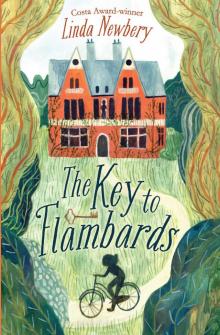 The Key to Flambards
The Key to Flambards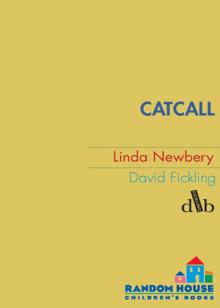 Catcall
Catcall Sisterland
Sisterland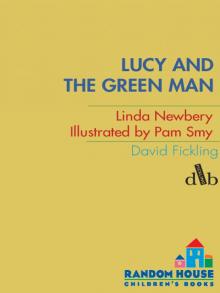 Lucy and the Green Man
Lucy and the Green Man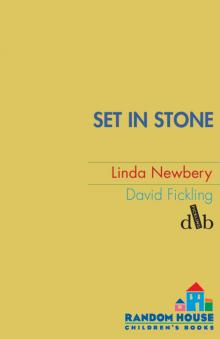 Set In Stone
Set In Stone Lob
Lob Andie's Moon
Andie's Moon The Shell House
The Shell House Girls on the Up
Girls on the Up The Sandfather
The Sandfather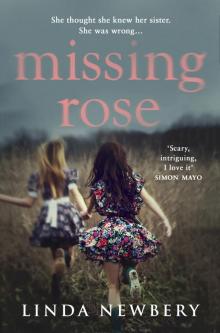 Missing Rose
Missing Rose Polly's March
Polly's March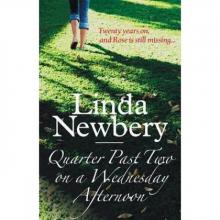 Quarter Past Two on a Wednesday Afternoon
Quarter Past Two on a Wednesday Afternoon Flightsend
Flightsend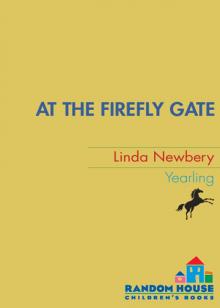 At the Firefly Gate
At the Firefly Gate